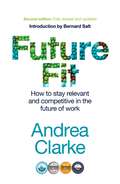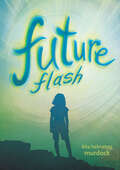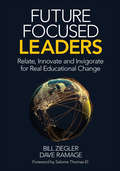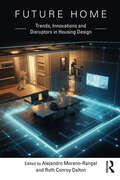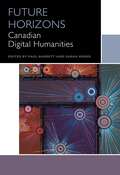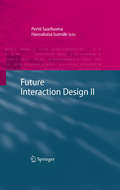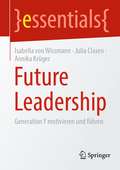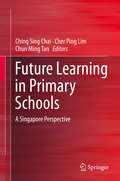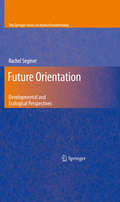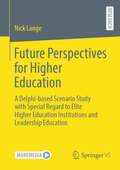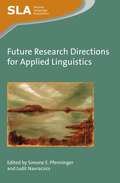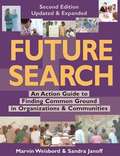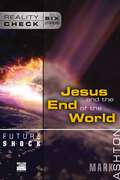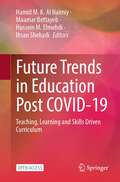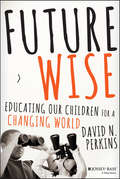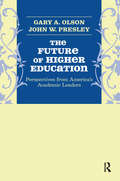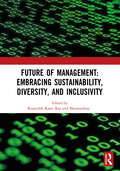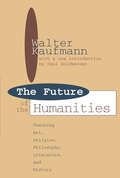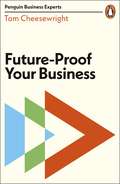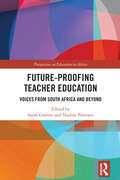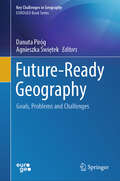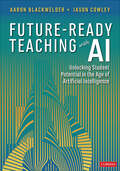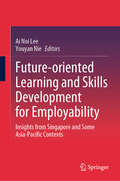- Table View
- List View
Future Fit: How to stay relevant and competitive in the future of work
by Andrea ClarkePrepare for the future with the eight skills needed to become future fit.Winner, Australian Business Book of the Year 2019Finalist, UK Business Book Awards 2020Finalist, Australian Career Book of the Year 2019 The need for skills that defy disruption has never been so urgent, as traditional workplace models give way to confronting new rules of engagement. If you&’re looking for job security, growth and acceleration in a radical new workforce, then Future Fit is the place to start. Award-winning author Andrea Clarke shares her experience, expertise and tactical advice on how to become truly future fit. &‘The future of work is here and it&’s about talent – your talent. It&’s about upgrading our human skills because they&’re landing differently in a hybrid environment,&’ says Clarke. &‘These skills are powerful differentiators in a dynamic and demanding new workplace.&’ Using her experience from a vibrant and varied career, Clarke explores the eight real skills we need for the future: Reputation Capital, Adaptability, Communication, Networking, Creativity, Problem solving, Leadership and Learning. A former Washington, DC, news reporter, Iraqi humanitarian aid worker and EdTech pioneer, Clarke founded FutureFitCo in 2012 – a business that trains emerging leaders to accelerate these core competencies. The Future Fit Digital Program, adapted from this book, is delivered globally to multi-national organisations. &‘Future Fit is a potent toolkit for anyone wanting not only to keep up with the head-spinning pace of workplace change, but to position themselves to excel within it.&’Sydney Morning Herald
Future Flash
by Kita Helmetag MurdockFor as long as she can remember, Laney's been having "future flashes"-visions of the future that she sees when she makes physical contact with another person. Left on a doorstep as a baby, Laney's past has always been cloudy to her, despite the clarity with which she can see the future. Her caretaker, Walt, claims to be her father, but Laney has a nagging suspicion that he isn't quite telling her the entire truth. And when a new kid, Lyle, moves to her small town, Laney is dreading meeting him-she almost always gets a future flash when first meeting someone new and they aren't always good. Unfortunately, her meeting with Lyle isn't just bad; it's painful. Engulfed in flames, Lyle's future flash is the worst Laney's ever experienced. But what does it mean? Is there anything Laney can do to change the future? And will she be able to save Lyle not only from a firey death but also from the merciless class bully without becoming a victim of his antics herself?In this thrilling and imaginative middle grade novel from author Kita Helmetag Murdock, follow Laney as she works against the clock to understand her past and prevent the disaster looming in the future. Aimed at readers ages 8 to 12, the book encompasses important themes such as identity, bullying, friendship, family relationship, and more. Kids will identify with Laney, who is a bit of an outsider but also has a good moral compass, and will love her supernatural abilities. Parents, teachers, and librarians will see the value in the themes discussed and in the positive outcome of the book with a very hopeful tone.
Future Focused Leaders: Relate, Innovate, and Invigorate for Real Educational Change
by Bill Ziegler Dave RamagePromote the skills and experiences that equip students to thrive in the future! Future Focused Leaders concentrates on three areas, Relate, Innovate, and Invigorate, that will engage and empower school leaders to effectively prepare students and educators for the future. This book provides best practices, practical tools, and research-based strategies that educators can immediately apply for sustainable innovation in their leadership. With maintaining positive change in mind, this book also offers: Examples, vignettes, and activities for reflection and action A self-evaluation rubric to check your ability to relate, innovate, and invigorate
Future Focused Leaders: Relate, Innovate, and Invigorate for Real Educational Change
by Bill Ziegler Dave RamagePromote the skills and experiences that equip students to thrive in the future! Future Focused Leaders concentrates on three areas, Relate, Innovate, and Invigorate, that will engage and empower school leaders to effectively prepare students and educators for the future. This book provides best practices, practical tools, and research-based strategies that educators can immediately apply for sustainable innovation in their leadership. With maintaining positive change in mind, this book also offers: Examples, vignettes, and activities for reflection and action A self-evaluation rubric to check your ability to relate, innovate, and invigorate
Future Home: Trends, Innovations and Disruptors in Housing Design
by Ruth Conroy Dalton Alejandro Moreno-RangelGlobal pandemics, smart technologies, demographics and climate change are just some of the external disruptors that may impact the home’s evolution over the next ten years. Future Home provides a comprehensive ‘horizon scan’ of what our homes may be like approximately ten years from now, by looking for early signs of potentially important developments through a systematic examination of trends, innovations and disruptors. The authors consider what aspects of the home are likely to remain constant and what aspects may change beyond all recognition and if changes are predicted, what form they may take and, most importantly, what this means for design professionals. Exploring areas of buildings and technology, people and delivery, each chapter addresses the catalysts, natures and responses to these changes. This book provides an overview of the future home that will be essential reading for designers, policy-makers and homeowners alike.
Future Horizons: Canadian Digital Humanities (Canadian Literature Collection)
by Susan Brown Gregory Betts Dean Irvine Sandra Djwa Constance Crompton Katherine McLeod Klara Du Plessis Kiera Obbard Roopika Risam Andrea Zeffiro Deanna Fong M Ryan Fitzpatrick M Eric Schmaltz Dani Spinosa M David Gaertner M Mark V. Campbell M Jon Saklofske Julia Polyck-O’Neill Kim Martin Rashmeet Kaur Pascale Dangoisse Michelle Schwartz Graham H. Jensen M Allan Cho Sarah Zhang Kendra Cowley Asen IvanovAu fil des vingt et quelques chapitres que compte cet ouvrage, les auteurs explorent le passé, le présent et l’avenir de la recherche, de l’enseignement et de l’expérimentation en sciences humaines numériques au Canada. Ce recueil, qui rassemble les travaux de chercheuses et de chercheurs établis et émergents, présente des initiatives contemporaines dans le domaine des sciences humaines numériques. Celles-ci sont conjuguées à un réexamen de l’héritage légué par ce domaine jusqu’à ce jour et à des discussions sur son potentiel. Future Horizons jette aussi un regard historique sur des projets numériques d’envergure, quoique largement méconnus, qui ont été réalisés au Canada. Future Horizons fait plonger le lecteur dans des projets qui mettent à contribution une vaste gamme d’approches — des jeux numériques aux laboratoires ouverts, des archives sonores à la poésie numérique, des arts visuels à l’analyse textuelle numérique — et qui puisent dans des matériaux canadiens tant historiques que contemporains. Dans leurs essais, les auteurs font voir comment une telle diversité d’approches remet en cause la connaissance en permettant aux chercheurs de poser de nouvelles questions.Ce recueil remet en question l’idée selon laquelle il n’existerait qu’une seule définition des sciences humaines numériques ou une seule identité collective nationale. En observant les interactions du numérique avec la race, l’autochtonie, le genre et la sexualité — sans oublier l’histoire, la poésie et le concept de nation —, Future Horizons propose une vue élargie du travail à l’intersection des sciences humaines numériques et des sciences humaines traditionnelles dans le Canada d’aujourd’hui. Ce livre est publié en anglais.Formats disponibles : couverture souple, PDF accessible et ePub accessible.
Future Interaction Design II
by Pertti Saariluoma Hannakaisa IsomäkiThe perspectives and techniques used in human-computer interaction design, practice and research are broadening. This book looks at emerging approaches which are likely to contribute to the discipline in near future. The underlying idea is that human character rather than technology should determine the nature of interaction. The concept of "interaction design" covers this range of concerns relevant to enabling quality design. Each chapter emphasizes alternative perspectives on interaction and new concepts to help researchers and practitioners relate to alternative design approaches and opportunities. This second volume provides a wider perspective, from both a scientific and geographic outlook. New topics, such as psychological design processes, gerotechnology, modelling, e-learning and subconscious experiences are discussed from a team of international authors. This book will be of considerable value to those seeking innovative perspectives upon designing and ensuring effective interaction between humans and technology.
Future Leadership: Generation Y motivieren und führen (essentials)
by Julia Clasen Isabella von Wissmann Annika KrügerWie wollen Mitglieder der Generation Y geführt werden? Auf Basis wissenschaftlicher Erkenntnisse liefert dieses essential Führungskräften, Beratern und Coaches praktische Handlungsempfehlungen und effektive Methoden für die erfolgreiche Führung von Nachwuchskräften. Anhand von aktuellen Studien werden Bedürfnisse und Erwartungen der Ypsiloner an Führung identifiziert und Erfolgsfaktoren zur Führung dieser Generation abgeleitet. Im Überblick werden drei zentrale Methoden agiler Führung vorgestellt: Scrum, Design Thinking und OKR. Resümierend können Ansätze des agilen Managements zur effektiven Führung von Mitarbeitern der Generation Y als erfolgversprechend bewertet werden.
Future Learning in Primary Schools
by Ching Sing Chai Cher Ping Lim Chun Ming TanThis edited book tells the story of the multifaceted efforts devoted by a "future school" in Singapore--The Nan Chiau Primary School--in shaping future learning. It documents the various measures implemented by one primary school to improve student learning outcomes in a technology-rich teaching and learning environment. With the current interest in Singapore's "Masterplan for ICT (information and communication technology) in Education," and the increasing focus on teaching and learning design by leading education researchers and professionals, this well-timed book will appeal to policy makers, educators and researchers.
Future Orientation
by Rachel SeginerWhere am I going? What do I want to do with my life? Such questions are typical of--even essential to--adolescence and continue to influence individuals throughout their lifetimes. And although human beings are capable of anticipating future events even as infants, the teen years are the peak period for weighing options and setting long-range goals. Future Orientation: Development and Ecological Perspectives synthesizes a wealth of theory and empirical data to explore future thinking as both a developmental process and an individual one. Starting with its origins in childhood, the book identifies the forces that affect this evolution, from early interactions with parents to personality traits and self-processes. Adolescents' future orientation is analyzed by its influences--a complex network of gender expectations, family and peer relationships, and cultural variables--and is, in turn, linked to developmental outcomes at school, capacity for intimacy, and adjustment in emerging adulthood and in adult life. This unique volume: Examines future orientation as an aspect of positive psychology, focusing on the stages of preadolescence, adolescence, and emerging adulthood. Relates future orientation with other psychological constructs relevant to this age group, including identity and self-esteem. Offers ecological and developmental perspectives to explore the effects of family members and peer groups on future thinking. Compares adolescent future thinking across cultures and discusses the roles of gender and gender constructs in future orientation. Complements developmental and educational psychology as well as counseling and parental guidance courses. Given the current climate of rapid social change, Future Orientation is an invaluable reading for researchers, clinicians, and practitioners, including child and school psychologists, psychiatrists, counselors, social workers, and others who work with young people during this critical juncture.
Future Perspectives for Higher Education: A Delphi-based Scenario Study with Special Regard to Elite Higher Education Institutions and Leadership Education
by Nick LangeIn recent decades, trends, such as educational expansion and globalization, have caused structural changes in higher education worldwide. To successfully place higher education institutions in an environment characterized by global competition, various nations have launched excellence initiatives that pursue the goal of producing universities that attain the label of “excellent”, “world-class”, or “elite”. These institutions are perceived as developing future leaders who foster positive change in society. Against this background, initiatives that foster elite higher education institutions must include various institutional factors. To holistically design initiatives an understanding of what constitutes an elite higher education institution is necessary. Against the background of the institutions’ relevance for developing leaders for society, investigating their connection to leadership education must be addressed as well. This book adopts a future-oriented perspective, developing scenarios that consider a variety of future developments which influence higher education as a whole and elite institutions in particular.
Future Research Directions for Applied Linguistics
by Judit Navracsics Simone E. PfenningerThis edited volume provides an overview of current thinking and directions for further research in applied linguistics by bringing together in a single volume a range of perspectives regarding original research agendas and innovative methodological approaches. It focuses not only on the challenges that applied linguistics researchers have been facing in recent years but also on producing workable and productive research designs and on identifying ways of how alternatives to conventional research methodologies can be used. Discussions featured in the volume include the so-called ‘Bilingual Advantage’ in psycho- and neurolinguistics; the optimal starting age debate in foreign language learning; the growing interest among applied linguists in more nuanced and more complex (statistical) data analysis and the priority given to more descriptive and social approaches to linguistics rather than to theorising. The collection will be a useful reference and stimulus for students, researchers and professionals working in the areas of applied linguistics, psycholinguistics, second language acquisition and second language education.
Future Search: An Action Guide to Finding Common Ground in Organizations & Communities
by Marvin Weisbord Sandra JanoffWhen the term ''future search'' appeared in Productive Workplaces (Weisbord, 1987), so many people sparked to it that we decided, after trying fancier names like ''strategic futures conference,'' to retain it. The response to the concept led to Discovering Common Ground (Weisbord et al, 1992), a work that pulled together principles and practices for value-based action planning. The earlier book presented a variety of high participation models and cases, most based on the Emery/Trist Search Conference, including early experiments with future search. In this book we focus on our evolving future search model. Here we go deeply into our sources and rationale, our experiments with tasks and techniques, and examples of how we and many colleagues have employed this model and its variations. We also provide a philosophical rationale for our design and facilitation practices. -amazon.com
Future Shock: Jesus and the End of the World (Reality Check)
by Mark AshtonThe Reality Check series makes just one assumption: that you’re serious enough about your spiritual journey to investigate Christianity with an open mind. This isn’t about joining anyone’s religious club—it’s about being real with yourself and with the others in your group. Since no one has all the answers, there’s plenty of room for discussion. After all, if there is any truth to the Bible’s stories about Jesus, then one thing he’d welcome are questions and opinions that come from honest, earnest hearts.What do you think the future holds? Right now it looks pretty scary. And Bible prophecy hardly brightens the picture—not with its mind-boggling images of singing saints, ten-horned monsters, mystical numbers, and a lake of fire. What does it all mean? Fortunately, it does mean something. A great deal. And while the Bible paints a grim future for a world bent on worshiping its own ways, it offers great hope for those whose hearts are set on God. Future Shock includes these sessions: Will Jesus Return This Year? · The Scroll Opener · After the Gavel Falls . . . · Ultimate Evil: The Antichrist, the Beast, and 666 · Happily Ever After? · Flight TrainingFor the Group LeaderReality Check is for spiritual seekers of every persuasion. Uncompromisingly Christian in its perspective, it steers wide of pat answers and aims at honesty. This innovative and thought-provoking series will challenge you and those in your group to connect heart to heart as together you explore the interface between Jesus, the Bible, and the realities of this world in which we live.
Future Trends in Education Post COVID-19: Teaching, Learning and Skills Driven Curriculum
by Hamid M. K. Al Naimiy Maamar Bettayeb Hussein M. Elmehdi Ihsan ShehadiThis open access book presents the proceedings of the first post COVID-19 conference on Education at the University of Sharjah, United Arab Emirates, on March 14-16, 2022. The book offers state-of-the-art approaches and methodologies in education post-COVID-19. It showcases emerging technology utilization in improving the quality of education, teaching and learning. It discusses the transformation of the curriculum, such as course design and delivery, assessment, and instructional methodologies that focus on employment readiness for the ever-evolving job market. Contributions include a wide range of topics such as online education, curriculum development, artificial intelligence, academic accreditation for hybrid & online learning. Given its scope, the book is essential reading for scholars, students, policy-makers, and education practitioners interested in a better understanding of technological innovations.
Future Wise
by David PerkinsHow to teach big understandings and the ideas that matter most Everyone has an opinion about education, and teachers face pressures from Common Core content standards, high-stakes testing, and countless other directions. But how do we know what today's learners will really need to know in the future? Future Wise: Educating Our Children for a Changing World is a toolkit for approaching that question with new insight. There is no one answer to the question of what's worth teaching, but with the tools in this book, you'll be one step closer to constructing a curriculum that prepares students for whatever situations they might face in the future. K-12 teachers and administrators play a crucial role in building a thriving society. David Perkins, founding member and co-director of Project Zero at Harvard's Graduate School of Education, argues that curriculum is one of the most important elements of making students ready for the world of tomorrow. In Future Wise, you'll learn concepts, curriculum criteria, and techniques for prioritizing content so you can guide students toward the big understandings that matter. Understand how learners use knowledge in life after graduation Learn strategies for teaching critical thinking and addressing big questions Identify top priorities when it comes to disciplines and content areas Gain curriculum design skills that make the most of learning across the years of education Future Wise presents a brand new framework for thinking about education. Curriculum can be one of the hardest things for teachers and administrators to change, but David Perkins shows that only by reimagining what we teach can we lead students down the road to functional knowledge. Future Wise is the practical guidebook you need to embark on this important quest.
Future of Higher Education: Perspectives from America's Academic Leaders
by Gary A. Olson John W. PresleyWritten by leading education experts and by university presidents, provosts, and other leaders nationally recognized for their innovations, the 22 original and provocative chapters in this new book comprise a wide-ranging examination of the many challenges faced in fashioning the university of tomorrow. Authors offer their research, predictions, concerns, and advice on topics ranging from university finances, student access, changing technologies, and the philosophical underpinnings of college education. They address the multiple challenges facing higher education today, offering ideas and solutions. Contributors include Warren Arbogast, Gretchen Bataille, Lee Benson, Rita Bornstein , Sally Clausen , Reed Way Dasenbrock, John A. Dossey, Jean Dowdall, James L. Fisher, Judy L. Genshaft , Henry A. Giroux, Ira Harkavy , Michael Hoad, Freeman A. Hrabowski, Stephen K. Klasko, James V. Koch, George Mehaffy , J. Hillis Miller, Gary A. Olson , John W. Presley, John Puckett , Michael Rao, Charles B. Reed, Rollin C. Richmond, Roseann Runte, Neil J. Smelser , Sheila M. Stearns, and Randy L. Swing.
Future of Management: Proceedings of ICMR-2024
by Koustubh Kanti RayIn response to unparalleled challenges and opportunities, the scope of management is undergoing a profound transformation. Organisations must adapt and innovate in order to flourish in an era characterised by rapid technological advancements, climate change, shifting demographics, and evolving social norms. The three pillars of modern management— sustainability, diversity, and inclusivity—reflect a comprehensive approach that prioritises the well-being of people and the planet over short-term profits and reflects a commitment to social responsibility. In the current era of management, sustainability has emerged as a critical issue. Organisations must incorporate ethical considerations into their decision-making processes, reduce their carbon footprints, and implement eco-conscious practices as the effects of climate change become more severe. According to Paul Polman, the former CEO of Unilever, “Sustainability is not a charity; it is a business case.”
Future of the Humanities: Teaching Art, Religion, Philosophy, Literature and History (Foundations Of Higher Education)
by Walter KaufmannThis book locates the humanities in six general fields of study: religion and philosophy, art and music, and literature and history. It offers suggestions for interdisciplinary work around topics such as punishment, and death and dying.
Future-Proof Your Business (Penguin Business Experts Series)
by Tom CheesewrightIt has never been more important for business leaders to look to the future. Yet, when we are living through some of the most uncertain times we have ever faced, it can feel daunting to know where to start. In Future-Proof Your Business, applied futurist Tom Cheesewright will reveal industry techniques and tools to help you: - Scan the near horizon for incoming shocks- Look to the far future to define long-term strategy- Accelerate decision-making in your business- Delegate power to the front line, speeding your response- Streamline your organisation so it's agile and can adapt to changeIn our uncertain times, leaders who keep their focus on the future will be the ones who prevail.
Future-Proofing Teacher Education: Voices from South Africa and Beyond (Perspectives on Education in Africa)
by Sarah Gravett Nadine PetersenThis book presents a variety of perspectives on teacher education for a fast-changing world. It deepens the discourse on teacher education and specifically considers teacher education in light of the technological advancements of the Fourth Industrial Revolution as well as education in times of uncertainty. Drawing on examples from South Africa and showcasing international authors, the book offers a nuanced evaluation of how teacher education might adapt for the future. It explores the tension between the perennial in education and the unpredictability of the future and asks the question of how teacher education can contend with these tensions and how teachers can prepare for unexpected circumstances. Chapters draw on the science of learning and foreground lessons learned from the abrupt move of teacher education online due to the COVID-19 pandemic. The book invokes these themes to reimagine and strengthen teacher education for the future, presenting reports on research, case studies, and theoretical stances. Future-Proofing Teacher Education explores what is relevant in teacher education in the 21st century and will be a key reading for researchers, academics, and post-graduate students of teacher education, technology in education, and digital education.
Future-Ready Geography: Goals, Problems and Challenges (Key Challenges in Geography)
by Danuta Piróg Agnieszka ŚwiętekThis book presents research on how geography as a science, as a university degree and as a school subject can get ready for the “future.” Today's world is in a state of permanent and radical change which is affecting society, science and the economy in equal measure. The concurrent processes of globalisation, digitisation, and integration shape and constantly modify the development factors and generate multidirectional social changes. Growing global issues related to climate change, food security, depletion of conventional energy sources, conflicts and wars, refugee crisis and pandemic open up new issues for geographic investigations as well as reinforce the need to examine old research topics covering a variety of subdisciplines. That is why the term “future-ready” is being more frequently used in discourses on geographic research. In particular, geographic education at schools should be subject to discussion and reflection as this is where our learners are primed to understand the world around them. The chapters of this book spread the knowledge about the role of geography in preparing the society for the future. The book responds to environmental, socio-economic, and political issues of global, regional and local impact. It provides methods, techniques and tools of data collection and analysis which efficiently support geographers in future-oriented research and help in forecasting environmental and social changes. Finally, this volume also discusses how to reinforce the position of geography as science and school subject today and in the future.
Future-Ready Teaching With AI: Unlocking Student Potential in the Age of Artificial Intelligence (Corwin Teaching Essentials)
by Aaron Blackwelder Jason CowleyPrepare your students for a future where AI literacy is crucial Artificial intelligence (AI) is here and seems on the brink of transforming education. As teachers, we know that AI will not diminish the need for students to learn essential skills. It will, however, change how we teach and will require us to develop new skill sets for instruction and assessment. Teachers have a new opportunity—to embrace future-ready instruction that prepares students to engage in a world that expects them to be AI literate. In Future-Ready Teaching With AI: Unlocking Student Potential in the Age of Artificial Intelligence, authors Aaron Blackwelder and Jason Cowley explore the integration of AI in the classroom and its potential to revolutionize teaching. Much more than simply a book about using AI tools, this rich resource aims to help teachers raise rigor, increase engagement, and promote more meaningful learning opportunities in their classrooms as they embrace the future of teaching and learning. Offering evergreen principles and strategies to help educators navigate the age of AI, this book Encourages critical thinking about the ethical use of AI to foster conversations with students Highlights various practical tools that can help teachers meet diverse student learning needs as well as create AI-proof assignments Includes chapter vignettes, sample AI prompts, activities, reflective questions, and links to online resources to support teachers′ work in the classroom Examines how to leverage AI to streamline rudimentary tasks such as lesson planning, assessment, and differentiation, allowing teachers to focus on building relationships, providing feedback, and personalizing learning for their students Written by two secondary teachers, this book is an essential resource for K–12 teachers and administrators looking to move beyond the basics of using AI. By equipping educators to become leaders in this transformation, Future-Ready Teaching With AI demonstrates how to harness the power of AI to help every student thrive.
Future-Ready Teaching With AI: Unlocking Student Potential in the Age of Artificial Intelligence (Corwin Teaching Essentials)
by Aaron Blackwelder Jason CowleyPrepare your students for a future where AI literacy is crucial Artificial intelligence (AI) is here and seems on the brink of transforming education. As teachers, we know that AI will not diminish the need for students to learn essential skills. It will, however, change how we teach and will require us to develop new skill sets for instruction and assessment. Teachers have a new opportunity—to embrace future-ready instruction that prepares students to engage in a world that expects them to be AI literate. In Future-Ready Teaching With AI: Unlocking Student Potential in the Age of Artificial Intelligence, authors Aaron Blackwelder and Jason Cowley explore the integration of AI in the classroom and its potential to revolutionize teaching. Much more than simply a book about using AI tools, this rich resource aims to help teachers raise rigor, increase engagement, and promote more meaningful learning opportunities in their classrooms as they embrace the future of teaching and learning. Offering evergreen principles and strategies to help educators navigate the age of AI, this book Encourages critical thinking about the ethical use of AI to foster conversations with students Highlights various practical tools that can help teachers meet diverse student learning needs as well as create AI-proof assignments Includes chapter vignettes, sample AI prompts, activities, reflective questions, and links to online resources to support teachers′ work in the classroom Examines how to leverage AI to streamline rudimentary tasks such as lesson planning, assessment, and differentiation, allowing teachers to focus on building relationships, providing feedback, and personalizing learning for their students Written by two secondary teachers, this book is an essential resource for K–12 teachers and administrators looking to move beyond the basics of using AI. By equipping educators to become leaders in this transformation, Future-Ready Teaching With AI demonstrates how to harness the power of AI to help every student thrive.
Future-oriented Learning and Skills Development for Employability: Insights from Singapore and Some Asia-Pacific Contexts
by Ai Noi Lee Youyan NieThis book examines evolving trends in pre-employment and continuing education, focusing on how formal learning affects learners’ skills, career motivation, and work readiness. It also addresses adult workers’ skills development, continuous training and workplace learning, highlighting key enablers, barriers and factors influencing their motivation and employability. Drawing on insights from experienced scholars and practitioners from Singapore and some Asia-Pacific contexts, including Australia, Bangladesh, and China, the book uniquely integrates the synergy between pre-employment and continuing education, offering a deeper understanding of their interconnectedness in fostering a sustainable workforce. As a comprehensive resource, it provides valuable insights for advancing higher education, vocational training, continuing education, workplace learning, and workforce development.
